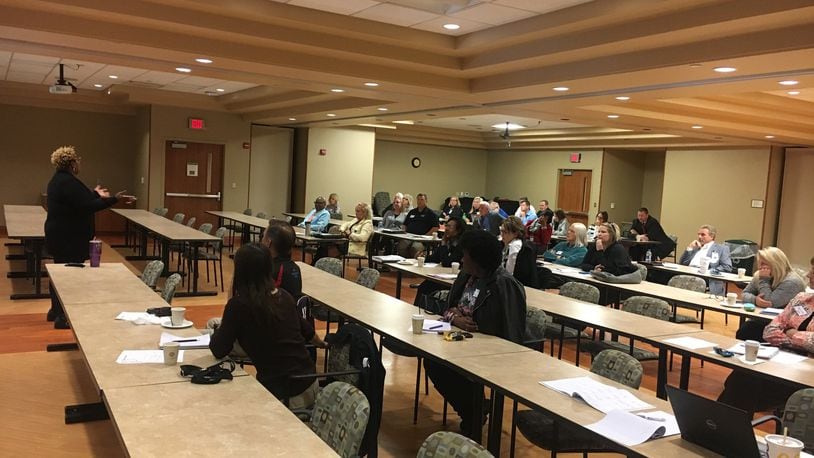City Manager Doug Adkins said in September there were 20 overdose EMS runs, including in one death. The number of drug overdose calls is 10 to 15 percent below where it was this time last year. There were 77 fatal overdoses in the city in 2017, 53 last year and 39 through September of this year, according to the city’s monthly substance abuse report.
MORE MIDDLETOWN: Advocates: Homelessness ‘not new problem’ for Middletown
Health Commissioner Jackie Phillips said there are nine syringe exchange programs in Southwest Ohio, including one in Middletown, and so far this year, 286 people have visited the center for syringe exchanges and medical tests.
Maj. David Birk said Middletown police have seized 2,600 grams of heroin, other illegal drugs, 21 guns and more than $198,000 in cash from suspected drug dealers this year. He is said the department’s five K-9 officers are doing “very good” work.
While La Shanda Sugg, owner, therapist and consultant for Labors of Love, praised the city on proactive health initiatives, she said there’s a difference between coping with and healing the drug problem. Healing is more important, she said.
She was keynote speaker, and her message was clear: The people who are struggling with addiction are there based on the human experience of trying to stay alive, trying to stay safe and remaining pain-free.
But sometimes, she said, addictive people face judgment and isolation from the outside.
“People are disconnecting with them instead of connecting with them,” she told the 30 people who attended the seminar. “People who have addictions almost always have a trauma background.”
So anyone who supports that person — family, friends and professionals — needs to understand addictions and trauma and “a better way of helping.”
Sugg was asked why those dealing with addictions don’t just stop. She compared addictions to driving a car in a rural area while needing to use the restroom, and you aren’t sure of the next opportunity.
“You’d be hard pressed to think of anything but finding a toilet,” Sugg said after the seminar. “It’s a biological drive that has to get done. You become hyper focused on it. As much as you’d like to tell someone, ‘Why don’t you just stop thinking about it?’ that doesn’t happen.
“And that is the same experience with addiction. Because of the addictive nature and how the brain works, they are hyper focused on getting what their brain feels is the only way they’re going to continue to survive.”
Those struggling with addictions, she said, have a difficult time controlling their minds.
“The brain thinks they’re going to die without it and far less about what they need for pleasure,” she said. “When people can understand that and other biological drives, that they can’t just stop, it gives a different perspective.”
About the Author
